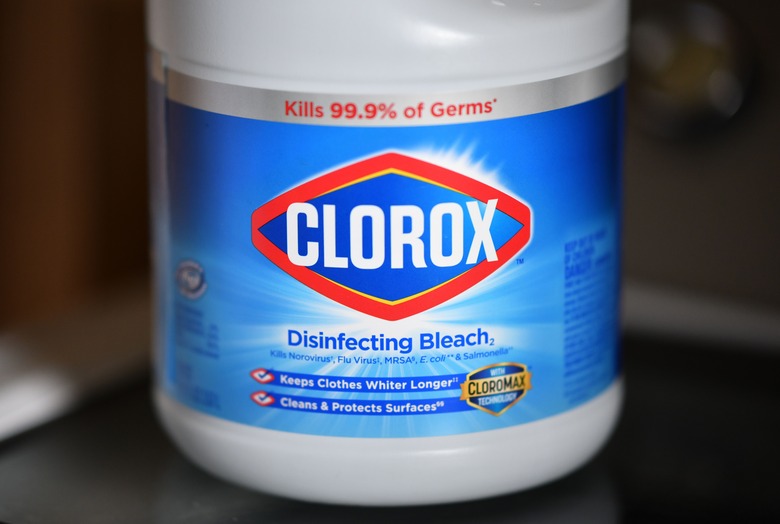What Household Chemicals Can Cause A Chemical Reaction?
We may receive a commission on purchases made from links.
Household chemicals that you use to make your life easier can become health hazards when mixed improperly. Some household cleaning agents are more or less harmless, while others can react to release toxic gases when combined. Vinegar and baking soda, for example, won't cause you any harm. A mixture of ammonia and bleach, on the other hand, is a different matter. A general rule is to avoid mixing different chemicals together, especially if you don't know how they'll react.
Tip
Chlorine bleach can cause a chemical reaction with many different cleaners and household items, including acids and ammonia. Acids also react with ammonia, sodium hydroxide and baking soda.
Bleach and Most Other Chemicals
Bleach and Most Other Chemicals
Regular household bleach is a strongly alkaline solution that reacts with many other household chemicals and cleaners, creating potentially dangerous gases. It reacts with acids, such as those found in many tile and toilet bowl cleaners, to generate chlorine gas, which quickly bubbles out of the solution. Chlorine was used as poison gas during World War I, and it's definitely not something you want to have around. Bleach can react with vinegar as well to release chlorine gas, although in this case far less is produced since vinegar is a weaker and less concentrated acid.
Ammonia, or cleaners containing ammonia, and chlorine bleach also will react to release a cocktail of toxic gases, including several chloramine compounds and even hydrazine (a compound often used to make rocket fuel). The fumes can be fatal or explosive. The combination can also cause chemical burns all over your body. That's why mixing ammonia and bleach at home is never a good idea.
Another toxic combination is bleach and rubbing alcohol, which can produce chloroform and other dangerous byproducts. The vapors can cause burns to your skin, lungs and eyes. In high concentrations, they can affect your nervous system, kidneys and liver. In some cases, the chemical reaction can be fatal. The safest option is to dilute bleach with water only and never combine it with other chemicals or cleaners.
Acid, Ammonia and Sodium Hydroxide
Acid, Ammonia and Sodium Hydroxide
Acids such as those found in tile or toilet bowl cleaners, vinegar and lemon juice can react with ammonia and sodium hydroxide, both of which are basic. Ammonia solutions will undergo a neutralization reaction with an acid; vinegar and ammonia, for example, form ammonium acetate. Sodium hydroxide is a much stronger base found in some oven cleaners and most drain clog remover products. It too reacts with acids, but the reaction here is more violent and can release a considerable amount of heat.
Baking Soda and Acid
Baking Soda and Acid
Mixing baking soda with an acid such as lemon juice, vinegar or hydrochloric acid from pool supplies will cause an acid-base neutralization, much like the ammonia and the vinegar. An acid-base neutralization with sodium bicarbonate, however, nearly always releases a large amount of carbon dioxide bubbles. As the concentration of carbonic acid in the solution increases, it decomposes to CO2 and water, and the solution bubbles furiously. Hydrogen peroxide also can cause a somewhat violent reaction when combined with chlorine bleach.
Flammable Household Chemicals
Flammable Household Chemicals
Among the most dangerous chemical reactions you can have in your household are those involving flammable chemicals. Acetone is highly volatile, and at sufficient concentrations, its vapor can be ignited by heat or spark and start combustion (which is, after all, a chemical reaction). Many nail polish removers contain acetone. Combining acetone chemicals with bleach can create fatal fumes.
Chemicals such as the ethanol in liquor and the isopropanol in rubbing alcohol are also flammable, although they are typically diluted with water and hence difficult to burn. Natural gas and propane, of course, are also highly flammable.
